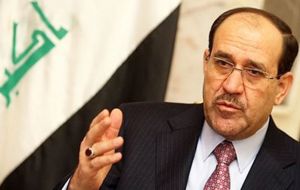MercoPress. South Atlantic News Agency
Violence threatens to thwart Iraqi oil resurgence
 PM Nouri al-Maliki seems unable to hold the country together while the Al-Qaeda challenge expands
PM Nouri al-Maliki seems unable to hold the country together while the Al-Qaeda challenge expands By Nicholas Cunningham - A wave of violence has swept parts of Iraq at the start of 2014 as the central government fights back against Al-Qaeda aligned militants in Anbar Province. The Islamic State of Iraq and the Levant (ISIL) reportedly took control of Ramadi and Fallujah, bombing police headquarters and killing dozens.
On New Year's Day Prime Minister Nouri al-Maliki sent in reinforcements to take back control of Anbar Province's two largest cities. The clashes kick off 2014 in much the same way as 2013 ended – a return to violence in a country that had seen important security gains in recent years.
Over 7.800 civilians were killed in Iraq in 2013, the bloodiest year over the past five. The latest violence occurred in Anbar Province, a region that dogged the US military during its decade-long war. ISIL is also engaged in fighting Syrian president Bashar al-Assad, and the latest string of events indicates that the violence of the Syrian civil war is spreading deeper into Iraq.
The conflict has yet to affect Iraq's oil fields, and production hit 3.2 million barrels per day (bpd) in December, the most since August 2013, according to Bloomberg. To be sure, the violence does not pose an immediate threat to Iraq's oil output, as three-fourths of the country's production comes from the South, and much of the rest from Kurdistan in the North. In fact, according to the EIA, a majority of Iraq's oil production comes from three fields – Kirkuk, and the North and South Rumaila fields near Basra. The latest violence is not located near these areas.
Still, the instability and the loss of control of key cities by the Iraqi government underscores the intense security challenge facing the country as it seeks to ramp up oil production in the coming years. Iraq has a stated goal of tripling oil production to 9 million bpd by 2020. In a 2012 special report on Iraq, the IEA estimates a slightly less rosy figure of 6.1 million bpd by the end of the decade in its central scenario.
With the immense challenges facing Iraq's oil sector, even doubling today's output over the next six years looks rather ambitious. Iraq still has not agreed on a hydrocarbons law that would outline oil governance. Kurdistan is making brazen moves aimed at increasing its independence from the central government in Baghdad. This may help to boost Kurdish oil production, but political conflict between the semi-autonomous region and the Maliki government casts a shadow of uncertainty over the country's oil industry. Most importantly, however, is the violence that threatens the stability of Iraq, which is now the second largest OPEC producer after Saudi Arabia.
While Iraq's failure to meet its ambitious oil production goals may seem to be a problem solely for Iraq, oil consumers around the world may be more dependent than they realize on the oil fields of Rumaila and Kirkuk. Over the next 20 years, according to the IEA's latest World Energy Outlook, Iraq will account for the largest source of additional oil production to global markets. Yet, its failure to live up to those hopeful projections – and given the latest reports of violence, that seems entirely plausible – will send prices much higher than the 2035 price of $128 per barrel that the IEA predicts, as supply does not keep pace with demand.
Source: Oilprice.com




Top Comments
Disclaimer & comment rules-

-

-

Read all commentsSouth Atlantic News Agency,,,,
Jan 09th, 2014 - 07:01 pm 0Does one notice how further and further away from the south Atlantic we seem to be going,
Or perhaps Iraq is moving its capitol to south America..lolol.
I think its a tenuous link to our involvement in Iraq.
Jan 09th, 2014 - 07:34 pm 0At the time I thought it was right.
Now I am not so sure.
But given that we were involved, we now how it to Iraq to support their efforst towards democracy.
It might not be pallatable, ebut nevertheless, there it is.
Democracy, or their version of it or radicalism.
Not much of a choice, is it?
“At the time I thought it was right.
Jan 09th, 2014 - 08:48 pm 0Now I am not so sure.”
it was wrong.
you are not sure because you are a moron
Commenting for this story is now closed.
If you have a Facebook account, become a fan and comment on our Facebook Page!